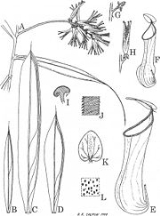
Nepenthes angasanensis
Encyclopedia
Nepenthes angasanensis is a highland Nepenthes
pitcher plant
species, native to Sumatra
, where it grows at an altitude of 2200 to 2800 m. The status of this taxon
is controversial as it is similar in morphology to N. mikei
and N. tobaica
.
The specific epithet refers to Mount Puncak Angasan, from which the type specimen was collected. No forms or varieties of N. angasanensis have been described.
In 2001, Charles Clarke
performed a cladistic analysis of the Nepenthes species of Sumatra and Peninsular Malaysia
using 70 morphological characteristics of each taxon. The following is a portion of the resultant cladogram
, showing part of "Clade 6". The sister pair of N. angasanensis and N. mikei has 79% support.
Nepenthes
The Nepenthes , popularly known as tropical pitcher plants or monkey cups, are a genus of carnivorous plants in the monotypic family Nepenthaceae. The genus comprises roughly 130 species, numerous natural and many cultivated hybrids...
pitcher plant
Pitcher plant
Pitcher plants are carnivorous plants whose prey-trapping mechanism features a deep cavity filled with liquid known as a pitfall trap. It has been widely assumed that the various sorts of pitfall trap evolved from rolled leaves, with selection pressure favouring more deeply cupped leaves over...
species, native to Sumatra
Sumatra
Sumatra is an island in western Indonesia, westernmost of the Sunda Islands. It is the largest island entirely in Indonesia , and the sixth largest island in the world at 473,481 km2 with a population of 50,365,538...
, where it grows at an altitude of 2200 to 2800 m. The status of this taxon
Taxon
|thumb|270px|[[African elephants]] form a widely-accepted taxon, the [[genus]] LoxodontaA taxon is a group of organisms, which a taxonomist adjudges to be a unit. Usually a taxon is given a name and a rank, although neither is a requirement...
is controversial as it is similar in morphology to N. mikei
Nepenthes mikei
Nepenthes mikei is a tropical pitcher plant endemic to Sumatra. It is characterised by its black mottled lower and upper pitchers. The species is closely related to N. angasanensis and N. tobaica....
and N. tobaica
Nepenthes tobaica
Nepenthes tobaica is a tropical pitcher plant endemic to Sumatra. It is particularly abundant around Lake Toba, after which it is named....
.
The specific epithet refers to Mount Puncak Angasan, from which the type specimen was collected. No forms or varieties of N. angasanensis have been described.
Taxonomy
| Character | N. angasanensis | N. mikei | N. tobaica |
|---|---|---|---|
| Habit | Produces offshoots from underground rhizomes | No rhizomes | No rhizomes |
| Spur | Forked | Fasciculate | Filiform |
| Inner margin of peristome | Teeth to 1.5–2 mm long | Teeth to 0.2-0.4 mm long | Teeth < 0.2 mm |
| Stem cross section | Cylindrical | Cylindrical | Cylindrical to obtusely triangular |
| Bracteoles | Sometimes near base of lowest pedicel only | Half way up every pedicel | At base or slightly below pedicel attachment, few |
| Pitcher glands | 300 / cm² | 150-180 / cm² | 200-250 / cm² |
| Pedicels | 1-flowered | 1-flowered | 2-flowered |
| Inflorescence (female) | 55–125 mm long, 9-17 flowers | 40–80 mm long, 4-10 flowers | 195–400 mm long, 30-50 flowers |
In 2001, Charles Clarke
Charles Clarke (botanist)
Dr. Charles M. Clarke is a botanist and taxonomist specialising in the carnivorous plant genus Nepenthes. Clarke has an honours degree in Botany from Monash University in Melbourne, and a Ph.D. in Ecosystem Management at the University of New England, in Armidale, New South Wales.Clarke first...
performed a cladistic analysis of the Nepenthes species of Sumatra and Peninsular Malaysia
Peninsular Malaysia
Peninsular Malaysia , also known as West Malaysia , is the part of Malaysia which lies on the Malay Peninsula. Its area is . It shares a land border with Thailand in the north. To the south is the island of Singapore. Across the Strait of Malacca to the west lies the island of Sumatra...
using 70 morphological characteristics of each taxon. The following is a portion of the resultant cladogram
Cladogram
A cladogram is a diagram used in cladistics which shows ancestral relations between organisms, to represent the evolutionary tree of life. Although traditionally such cladograms were generated largely on the basis of morphological characters, DNA and RNA sequencing data and computational...
, showing part of "Clade 6". The sister pair of N. angasanensis and N. mikei has 79% support.
Natural hybrids
The following natural hybrids involving N. angasanensis have been recorded.- N. angasanensis × N. densifloraNepenthes densifloraNepenthes densiflora is a tropical pitcher plant endemic to Sumatra, where it grows at an altitude of between 1700 and 3200 m above sea level.No forms or varieties of N. densiflora have been described.-Taxonomy:...
External links
- Photographs of N. angasanensis at the Carnivorous Plant Photofinder

